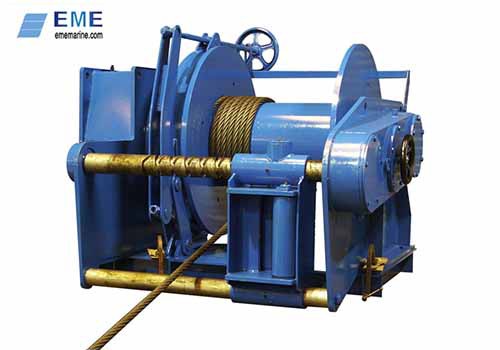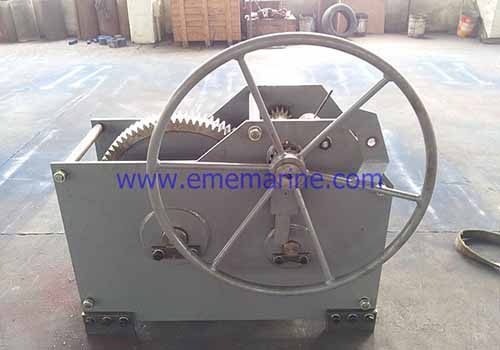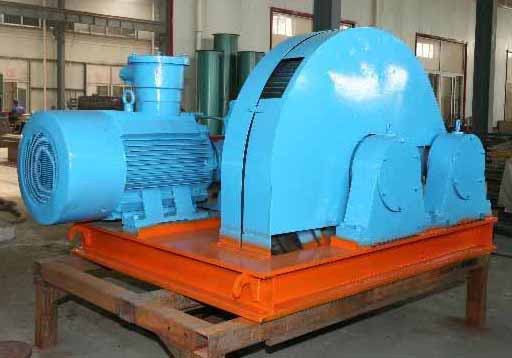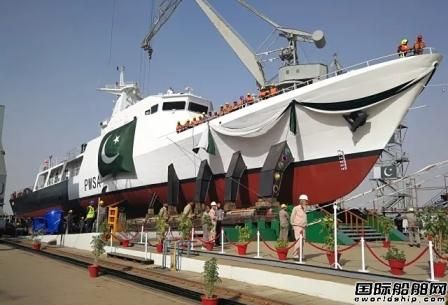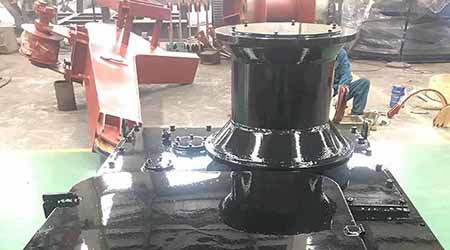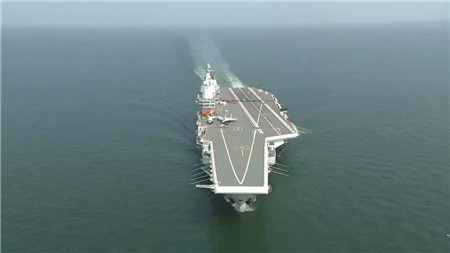
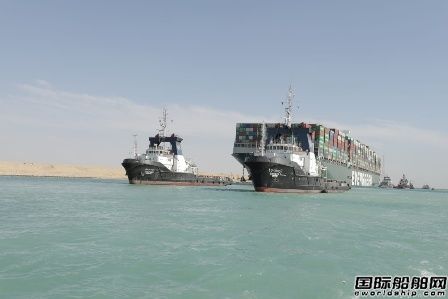
After nearly a week of blockage, the Suez Canal has finally been reopened to traffic, with more than 400 ships expected to pass through in three and a half days, but the knock-on effects of the grounding of the vessel "Chang Chi" are likely to take months to clear.
Suez Canal reopens to clear backlog of over 400 ships in four days
Satellite maps show that on 29 March, after a two-hour voyage, the vessel had entered the Great Bitter Lake in the middle of the Suez Canal, currently travelling at 7.6 knots. The lake has a natural waterway 9 km wide and 17 km long, which allows ships of all kinds to travel unimpeded.
Osama Rabie, head of the Suez Canal Authority, said that the Suez Canal had been opened following the successful de-watering and transfer of the vessel Chang Chi to the Great Bitter Lake and that the current backlog of 422 boats could be cleared within 3.5 days and traffic would be back to normal within four days, "We will work around the clock to release the backlog of ships".
Rabie expects 113 boats to have passed through the canal in both directions by early morning on 30 March local time. He also said that ships of a similar size to the world's largest container ship, the "Chang Chi", could also pass safely through the canal and that the Suez Canal Authority would not change its policy on accommodating such ships.
Rabie added that priority was given to vessels carrying livestock because of the need to resupply them. It was reported that at least 20 vessels carrying livestock are estimated to have broken down due to the blockage, and that some 130,000 livestock transported on at least 10 of these livestock vessels are at risk of dying.
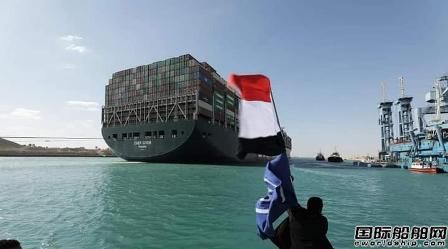
On the morning of March 29th, the ship had been partially floated, its course was 80% corrected and its stern was starting to leave the river bank. Egyptian President Sisi was the first to tweet his congratulations on the rescue of the vessel and his gratitude to the Egyptian people for finally rescuing the trapped ship against all odds, "Things are back on track through Egyptian hands and the whole world can be assured of a path for its goods and needs through this waterway ".
On the afternoon of the same day, the vessel finally broke free after being stranded for six days. According to a statement issued by Evergreen Marine, the charterer of the vessel, the vessel was refloated at 15:04 Egyptian time (21:04 Beijing time on the same day) and was successfully moved out of the original stranded channel with the assistance of a tugboat, allowing normal passage through the Suez Canal to resume.
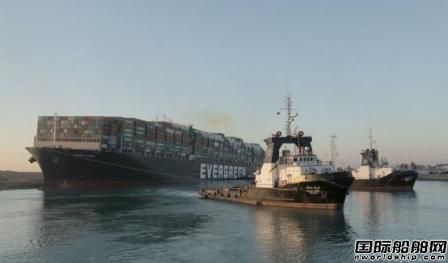
The Dutch specialist salvage company SMIT Salvage, whose parent company Boskalis was responsible for the rescue, also issued an announcement on the same day, announcing that SMIT's expert team had successfully refloated the vessel. To free the vessel, the rescue team dredged some 30,000 cubic metres of sediment to help free the vessel, using 11 harbour tugs and two powerful ocean-going tugs (the Alp Guard and the Carlo Magna). "Carlo Magna".)
Peter Berdowski, Boskalis CEO, said: "Shortly after the 'Chang Chi' ran aground, we were engaged through SMIT Salvage to assist in the salvage effort. I am pleased to announce that our team of experts, working closely with the Suez Canal Authority, succeeded in refloating the 'Chang Chi' at 15:05 local time on 29 March, thus making free navigation through the Suez Canal possible."
Previously, the Suez Canal Authority had set a deadline of March 30 for the vessel to begin unloading its containers on March 30 if it was not successfully de-shallowed by the evening of March 29 local time. However, with the spring tide, which was higher than ever before, the vessel was able to move about 23 metres and was finally able to break free.
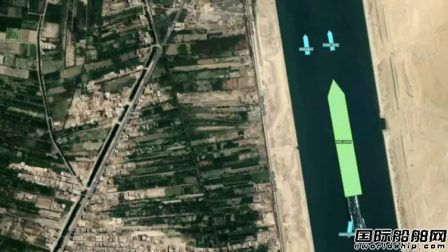
Evergreen Marine announced that the vessel will first be moved to the anchorage in the waters of the Great Bitter Lake of the Suez Canal for a seaworthiness inspection. The vessel's subsequent voyage and cargo delivery will be adjusted and arranged as necessary, depending on the results of the survey.
Rabie said that after the initial inspection, the vessel was able to sail on a limited basis with no damage to any of the containers, but a second inspection will be more precise and will show if it has been affected.
Shipping companies suffer heavy losses and the knock-on effects of the accident could last for months
While the Suez Canal Authority will release all blocked ships as soon as possible, Maersk, the world's largest shipping company, said the knock-on effects of the Suez Canal blockade that has disrupted global shipping could take weeks or even months to clear.
According to Clarkson's statistics, as of the morning of March 29, the Suez Canal "backlog" of ships reached 384 ships of 21.5 million GT, equivalent to 1.5% of the global fleet (in GT terms), including 88 container ships (4.2%), 101 bulk carriers (0.8%), 49 oil tankers ( 0.9%), 11 LNG vessels (1.9%), 11 LPG vessels (1.2%) and 18 car carriers (2.9%). The total value of ships "in the queue" is approximately US$12 billion, affecting more than 8,000 seafarers.
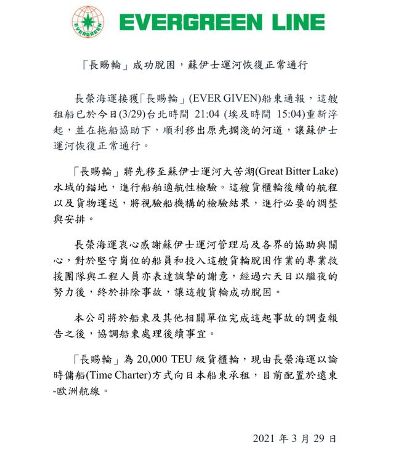
Industry sources estimate that owners and charterers of delayed ships will face unrecoverable expenses of at least US$24 million, as insurance policies do not cover these costs and cargo owners may also face uninsured losses. The Suez Canal is also an important source of foreign exchange earnings for Egypt and the suspension will cost the country US$14-15 million per day.
German insurance giant Allianz estimates that the Suez Canal blockage will cost global trade between US$6 billion and US$10 billion a week.
Jonathan Chappell, an analyst at investment bank Evercore, said the impact of this Suez Canal blockage will continue to affect the container shipping industry in the near future, as container ships make up a large proportion of Suez Canal traffic and several have already been detoured to Africa. Maersk is understood to have already re-routed 15 container ships around the Cape of Good Hope.
Chappell noted that the major European ports will see a simultaneous onslaught of containers in the coming weeks, further adding to widespread logistical bottlenecks across the continent; "waiting times in the canals, around the Cape of Good Hope and at anchorages outside ports, as well as the time required to wait for equipment turnaround at discharge ports, are likely to exacerbate the already severe inefficiencies across the containership fleet ". Alternatively, for tankers and bulk carriers, the blockade will favour higher freight rates, but to a much lesser extent.
The 193-kilometre-long Suez Canal is one of the world's busiest waterways, with around 12 per cent of global trade, about 10 per cent of the offshore oil trade and 8 per cent of global LNG transported through it. According to a report released by the Suez Canal Authority in January this year, a total of 18,829 ships with a net tonnage of 1.17 billion tonnes will pass through the Suez Canal in 2020, which translates into an average of 51 ships per day.
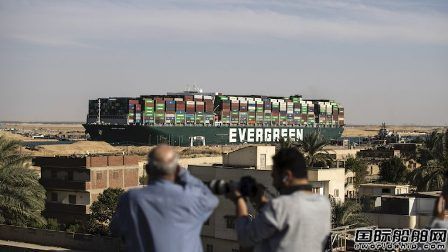
Local time on the morning of March 23, the "Chang Chi" ship from the Red Sea northward into the Suez Canal, suspected of strong winds caused by the bottom stranded, the ship stuck in the canal ends, resulting in this maritime trade artery completely blocked, which is considered to be the most serious congestion in the 150-year history of the Suez Canal event.
It is understood that the "Chang Chi" ship is a 20,388 TEU ultra-large container ship, 400 meters long, 59 meters wide, 15.7 meters draft, total tonnage of 219,079 tons, built by Japan's Imabari shipbuilding, shipowners for Imabari shipbuilding subsidiary Zheng Rong steamship, long-term lease to Taiwan Evergreen Marine. The ship departed from Ningbo on March 4, passed through Taiwan, Yantian, Tanjung Parapas, Malaysia, and arrived at the Suez Canal in Egypt on March 22, and was scheduled to arrive in Rotterdam, the Netherlands, on March 31, with about 18,300 containers on board.
For the cause of the accident, the Suez Canal Authority spokesman said, stranded can not be blamed solely on strong winds and weather reasons, there may also be human error and technical aspects of the problem, the accident will be dealt with after the investigation of the main causes of the "Chang Chi" ship stranded.
According to AFP Cairo on March 29, Egyptian President Sisi said on Monday local time that the rescue operation of the container ship "Chang Chi", which had been stranded in the Suez Canal for nearly a week, was "successful". Sisi tweeted, "Today, the Egyptians have succeeded in ending the crisis of the ship running aground in the Suez Canal, despite the complexity of the rescue process."
The Suez Canal, which opened in 1869, was dug by Egyptians "with human labour for generations", Sisi said. "Today, the Egyptians have proved that they are still up to the task."
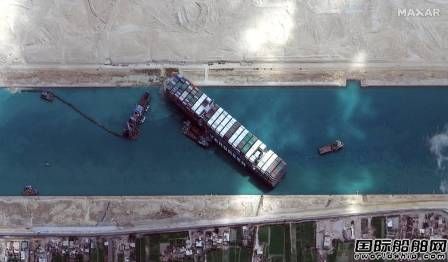
Taixing Expansion Marine Equipment (EME) is the professional designer, manufacturer and exporter of mooring winch, positioning winch, towing winch, anchor winch, diesel winch, electric windlass, hydraulic windlass, diesel windlass, electric capstan, hydraulic capstan, pneumatic capstan etc. Our products are mainly for scientific research vessel, navy vessel, working barge, tug, cargo vessel, oil tanker, offshore platform etc.
